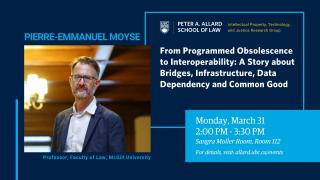Event Description
Interoperability seems to be the new Holy Grail. It populates the new European Digital Markets Act: the term is referred to more than forty times and has become a pivotal notion for a new normative agenda for the digital economy. Canadian law, too, although in a less effervescent context, seems to embrace the notion it sees as a solution to various issues. An example is Bill 72, tabled in 2024, whose title is self-explanatory: An Act respecting the interoperability of health information technology and to prohibit data blocking by health information technology vendors. Bill 294, recently voted and closer to my expertise, creates an interoperability exception in copyright law. How does law elevate a priori exogenous terms to structuring legal notion? The coming into legal being of interoperability tells a fascinating tale about the allocation of resources in the public space. The genealogy of interoperability brings us to the difficult questions of sharing of infrastructure and continues the debate about the limit of private actors' roles in generating public good. Not surprisingly, interoperability is presented as an emancipation principle: a lock breaker.
This new project - Insight SSHRC 2024 - is the second phase of a broader research agenda which aims at understanding the genealogy of the field of law, science and technology by explaining and challenging new notions that seem to be created by sudden legal eruptions. It immediately follows another Insight grant dedicated to elucidate the myth of programmed obsolescence and its sudden penetration into environmental and consumer law. As an anecdotical fact, the latter research took me – virtually - to the University of Alberta, place of the largest archive held in Canada on the technocracy movement in the 1930s and whose political beliefs explain, in part, the sudden and imprescriptible traction of the idea of planned obsolescence. You will find below a link to the unconventional text bridging planned obsolescence to programmed obsolescence and from which stems my research on interoperability.
This talk has been organized by the IP, Technology, and Justice Research Group.
Speaker
References
Moyse, Pierre-Emmanuel, Billie Godbout & Katherine Beaulieu, « De la garantie de qualité à l'obsolescence programmée. Étude empirique sur les cas de bris de produits portés devant la Cour des petites créances », (2023) 28-1 Lex Electronica, 65-128 Online.
Moyse, Pierre-Emmanuel, The Uneasy Case of Programmed Obsolescence (2020). Online at SSRN.
- Research
- All Students
- Faculty
- Graduate Students
- JD
- Staff
- Research Talks

